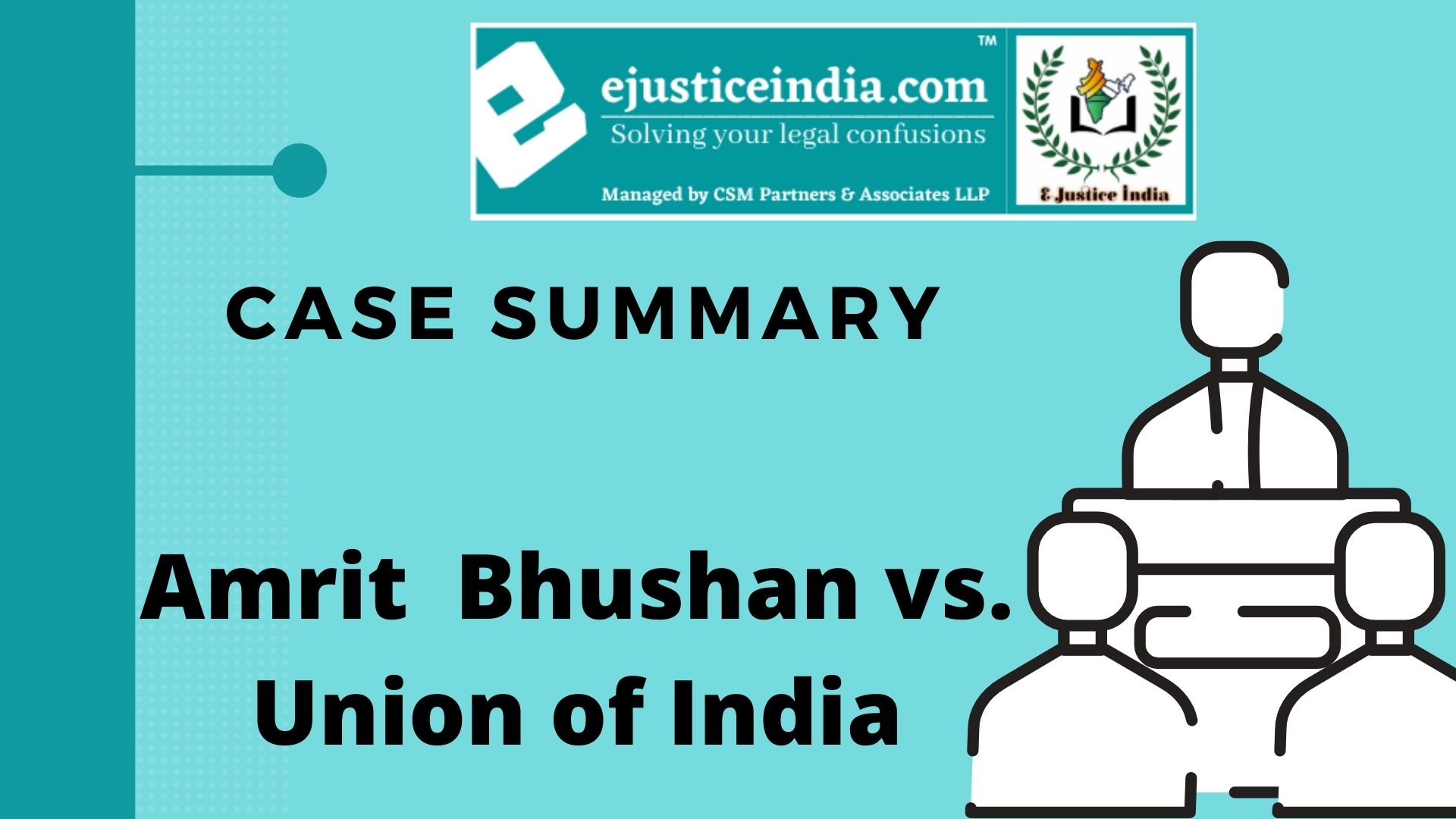Case Study: Smt. Sowmithri Vishnu v. Union of India, 1985
Author: Aadarsh Mishra (The ICFAI University, Dehradun)
Smt. Sowmithri Vishnu v. Union of India & Anr.
1985 AIR 1618 Cr LJ 1302 1985 SCR Supl. (1) 741
Writ Petition No. 845 of 1980
- Hon’ble Judges/ Coram: Y.V. Chandrachud, R.S. Pathak, Amarendra Nath Sen.
- Jurisdiction: Original Jurisdiction u/a 32 of The Constitution of India.
- Acts/ Sectionsinvolved: Section 497 of Indian Penal Code,1860; Articles 14,15 & 21 of The Constitution of India.
- Date of Judgement: 27th May, 1985.
2. Brief facts of the case.
In this case, a woman filed a petition for divorce against her husband on the ground that her husband had deserted her. The trial court dismissed the petition and held that it was actually the woman who had deserted the husband . After this ruling, the husband filed for divorce on two grounds that: she had deserted him and secondly that she was having extra-marital sexual intercourse i.e. Adultery. The trial court accepted both the contentions of the husband and granted him a decree for divorce. The wife conceded that she had deserted her husband and a decree may be passed against her for it, but she opposed the adjudication by the court on the matter of adultery saying that it was ‘unnecessary to do so’ The wife filed for a revision in the High Court and it held that it was unnecessary to inquire into the question of adultery in this case as the husband has already been granted a decree for divore on a ground contended by him.
The husband also filed a petition against the person, named Dharma Ebenezer with whom his wife had committed adultery. The petitioner wife) filed a writ petition in response to the complaint done by her husband and in it they contended that the very provision (Section 497 IPC) under which the husband has filed the complaint against the accused is unconstitutional.
3. Issues Raised in the case.
- Whether Section 497 of Indian Penal Code,1860 is in violation with article 14 of The Constitution of India?
- Whether Section 497 of Indian Penal Code,1860 violates the provisions of Article 21 of The Constitution of India?
4. Arguments of the parties.
Mrs. Nalini Chidambaram and Miss Seita Vaidyalingam appeared on behalf of the Petitioner.
B. Datta and R.N. Poddar appeared on behalf of Respondent No. 1.
Miss Lily Thomas appeared on behalf of Respondent No. 2.
4.1) Arguments on behalf of the petitioner.
The learned counsel contended that the provisions of Section 497 IPC violated Article 14 of the Constitution by making an irrational classification between men and women, and it unjustifiably denied women the right which is given to men. This argument was based on these three grounds:
- It confers upon the husband the right to prosecute the adulterer but it does not confer any right upon the wife to prosecute the woman with whom her husband has committed adultery.
- It does not confer any right on the wife to prosecute the husband who has committed adultery with another woman; and
- It does not take in cases where the husband has sexual relations with an unmarried woman with the result that the husbands have, as it were, a free license under the law to have extra marital relationship with unmarried woman.
Mrs. Nalini calls Section 497 as a flagrant instance of ‘ Gender discrimination’ , ‘Legislative despotism’ and ‘ Male chauvinism’.
The other argument advanced by the counsel was that Section 497 does not provide opportunity to the wife, with whom the accused had committed adultery, to be heard in the court . This violates Article 21 of the Constitution which along with right to life also contains the right to reputation and when a person’s reputation is at stake in any court of law then that person is entitled to be heard in that court of law and failure of it is infringement of his/her constitutional rights.
4.2) Arguments on behalf of the Respondent.
The learned counsel for the respondent said that the contentions by the petitioner has a very high emotive appeal but it lacks any legal basis. The counsel contended that by its very definition adultery can only be committed by a man and by restricting the class of offenders to men, no constitutional provision is infringed.
The counsel further contended that it is commonly accepted that it is the man who is the seducer and not the woman. So the law brings such men within its ambit who defile the sanctity of the matrimonial home by committing adultery.
To counter the last argument made by the petitioner, the counsel argued that if the woman, with whom the accused committed adultery, makes an application to be heard in the trial court; her application will receive due consideration and will be provided the opportunity to keep her side in front of the court.
5. Verdict.
The Supreme Court dismissed this writ petition and said that since the husband has already received a decree for divorce against the petitioner on the ground of desertion then it would be useless to investigate and inquire into the matter of adultery.
The Court observed that if it allows this writ petition and obliterates Section 497 from the law books then Adultery will have more free play than now. So, to protect the interests of the society at large Section 497 will continue to be in effect as it was before this case and will be used to punish the offenders falling in its radar. The court further observed that women may have started seducing men but it is for the legislature to take note of this transformation and make changes in the current laws if needed.
6. Conclusion.
The judgement dictated by the Hon’ble Supreme Court of India in this case upheld the constitutional validity of Section 497 of IPC which made adultery a culpable offence. The court rejected the contentions of the petitioner who sought deletion of Section 497 on the grounds of its inconsistency or derogation with the fundamental rights. The court said that even the erring spouses have no remedy against each other in criminal law , they can always look for the remedy in civil and seek divorce from their partners on the grounds of adultery. The court upheld the constitutionality of the said section to protect the interests of the society and sanctity of the marriage. It bounced the responsibility to the legislature to deal with this issue according to the behavioural pattern and need of the society.
The judgement did good to the society for more than 30 Years but in September 2018 it was overruled by the Supreme Court. Adultery was decriminalised and was left only as a ground for divorce[1]. The overruled verdict was the need of the time and changed society and it dispensed the post – millennial archaic law.
[1] Joseph Shine v. Union of India, 2018


